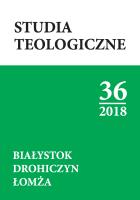Filozoficzne i światopoglądowe konsekwencje możliwości poznawczych człowieka
Philosophical and Ideological Consequences of Man’s Cognitive Abilities
Author(s): Piotr MrzygłódSubject(s): Christian Theology and Religion, Philosophy
Published by: Kuria Metropolitalna Białostocka
Keywords: cognition; reason; common sense; truth;knowledge; epistemological realism; cognition’s limits;reality;
Summary/Abstract: The problem of the existence of the unfailing measures of the authenticityof our cognition is what causes many “sleepless nights” to all epistemologists.Hence questions about the object of our cognition and the limits ofour intellectual perception of reality – still belong to the most fundamentalepistemological questions. The reasonableness of our contact with theworld and the sense of science and philosophy depend on the satisfactorysolution of these problems.Filozoficzne i światopoglądowe konsekwencje możliwości poznawczych człowieka42Many of the aporias defined in this text, concern not the cognitive techniquesor biological mechanisms of acquiring and perception of varioussensations, but much more basic problems. This study attempts to determinewhat “level of reality” of our cognition of the world we can actually reach.In other words: What do we really experience? “The very object itself ”(i.e. tree, pen, glass, sheet of paper, etc.) or rather its immaterial reflexes,so called “phenomena” (gr. phainomenon) of these “occurrences“? If so, itmight turn out that we are not in fact experiencing the external (material)things at all, but rather the intellectual ones, immaterial “representations”of the real ones which are created because of them.All these issues make us face the most important question of the cognitivephilosophy: Does reason, and connected with it “common sense”- cognitiverealism, always have a chance to defend themselves? In other words:do the natural existence and logic laws, which we intuitively use every day,warrant sufficient enough, objective cognition of surrounding us reality, orshould we look for other, new ones, so we would not be eaten completelyby our skepticism?If even the attempt to find the answers to these problems, which areoften referred to as “forbidden fruit” of so called “skeptical sting”, isn’t aneasy thing to do, so much more difficult are the ambitions to achieve satisfactoryanswers in that matter. This is one of the many conclusions of this– just “scholar” – publication.
Journal: Studia Teologiczne Białystok Drohiczyn Łomża
- Issue Year: 36/2018
- Issue No: 1
- Page Range: 9-42
- Page Count: 34
- Language: Polish

